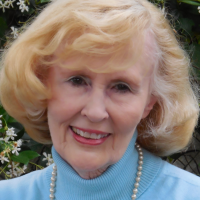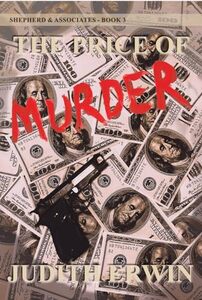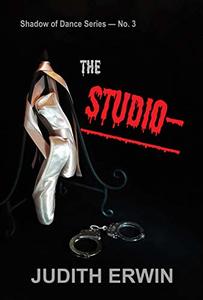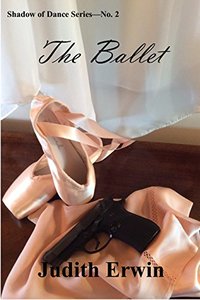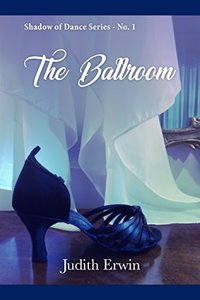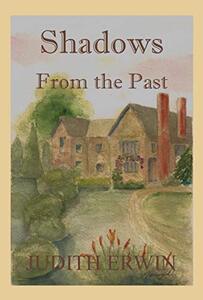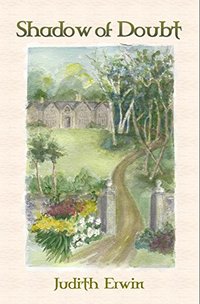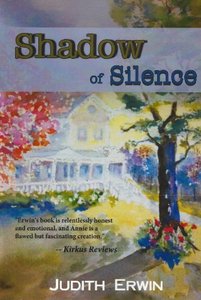Judith Erwin Interview Published on: 23, Apr 2019
 Give us some insight into your life growing up and how that has shaped you into the author you are today.
Give us some insight into your life growing up and how that has shaped you into the author you are today.
Growing up as an only child in apartments, often with no children my age in the building near my age, I relied on a love of books, dolls, a cat, and my imagination for companionship. As an adult, I have applied that devotion to writing and have used my imagination to bring life into my stories. A love of cats is in my DNA, going back at least four generations. It also carries through to my children and grandchildren.
What is it about the romantic suspense genre that originally captivated you? What, according to you, makes a really good romance?Romantic suspense fuels a belief in the magic of love, gives dimension to the characters, and ignites curiosity in the reader. A really good romance takes the reader into the lives of the characters, stirs the emotions, and haunts the reader when finished.
Who are some authors you admired growing up and how did their books colour your work today?Reaching way back to adolescence, R.D. Blackmore’s Lorna Doone introduced me to the power of love and an adoration of England. I fantasized about being Lorna. In addition, I grew up in the heart of the Gone with the Wind world. We lived in the Ansley Park section of Atlanta. My school bus picked me up in front of Margaret Mitchell’s apartment. Mother went to high school with Evelyn Keyes who played Scarlett O’Hara’s sister, Suellen, in the film. In my later teens, I moved on to Frank Yerby, reading every book he wrote. I loved his beautiful women, handsome men, elements of danger, and titillating love scenes that never breached good taste. In my novels, I hope to awaken the same emotions in my readers. Finally, I can’t leave out the great British authors: The Brontes and Jane Austen.
What gave you the idea for your book series "Shadows from the Past?" Who did you model the character Fury O'Quinn after?Shortly after completing the manuscript for Shadow of Doubt, I found myself driving to my son’s vacation home on a North Carolina mountain for my granddaughter’s wedding. As I drove, the thought of my Irish grandmother’s brother, who spend his adult life in a Georgia insane asylum, popped into my head. I recalled my father saying Uncle Jim was there because he threatened to kill his boss.”. As a family law attorney, I often had cases where a spouse threatened to kill the other. While it is a serious matter, no one served a life-sentence as a result. So, what did Uncle Jim do? Did he attempt homicide or just utter the words? Or did someone want his out of the way? I wanted to know. When I returned, I started research. After reading a book entitled Damnation Hospital, which included a book entitled, But for the Grace of God by a psychologist who worked at the hospital, I was appalled and hooked.
Fury O’Quinn was a character in my files for years before the book idea developed. I knew she had red hair, an audacious personality, and wrote romance novels with heroes she could not match in real life. Ergo, my committed uncle of the 1920s became Fury’s uncle. However, the rest of Fury’s story is strictly fiction.
What were your goals with the book "Shadow of Silence?" Do you think you achieved them?Annie Cameron’s story came about from my admiration for Joyce Carol Oates book, We Were the Mulvaneys, William Styron’s Sophie’s Choice, and an event occurring in one of my family law cases. However, what happened to Annie never happened to anyone I have known. My goals were to show that a situation can arise without an acceptable solution and that a single, fleeting event can alter the course of many lives. Given that a number of readers have said to me, “When I was reading the book, I wondered what I would have done if I had been Annie?” gives me reason to believe it produced my intended result.
When writing "Shadow of Doubt", what are some factors you considered while creating the character Ansley Sheridan? Which of your female characters is your favourite and why?Ansley Sheridan’s story was intended to illustrate the impact of betrayal and divorce on the party who sacrificed personal career development only to be left behind in the wake of a trusted partner’s careless and selfish whims. Having lived that scenario and represented many similarly situated individuals, I wanted to cast light on the seriousness of the issue. Ansley gave up a promising career that could not be recovered and thereby lost all faith in marriage. Moving forward, she could not release her distrust, even when tempted by a larger than life lover.
Asking me to choose my favorite female character, that is like asking me to choose my favorite grandchild. It can’t be done. I love them all. If you asked me which female character I would like to be, I would say Ansley Sheridan. Of all my characters, I used more of my personal life in her creation. However, Ansley is not Judith Erwin. She is ten percent me, ten percent my daughter, and eighty percent someone we would both like to be.
Being a graduate of the University of Florida, College of Law and having practiced family law for over twenty years, what motivated you to start writing? Who has been your biggest support in your journey of becoming an author?When I took my first college class at the age of forty-five, my only goal was to write a novel. On the way, I accidentally became an attorney.
Throughout the process of obtaining a degree from Jacksonville University, a law degree from the University of Florida, my law career, and the writing of my books, my number one supporter was my late significant other. We were together for over thirty-five years. Although I did not write in a genre Perry read, I would often seek his advice on a piece. He never failed to reassure me whenever my confidence faltered. He was my cheerleader, my defender, my backup—my emotional support.
Walk us through some of the research you had to do for your shape-shifting story "Shadow from the Past?" On an average, how long does it take you to do your research?For Shadows from the Past, my first step was to research the Central State Hospital at Milledgeville, Georgia, since Fury O’Quinn’s quest in the novel was to uncover the potential irregularities surrounding the commitment of her great-uncle. I read every Internet article I could find, researched old newspaper articles from the 1920s, and checked out books from our public library on the history of mental health. I contacted the clerk of court in the county where my great-uncle resided when committed to CSH, trying to locate any mental health or criminal records that would justify his commitment. CSH has been referred to as the “World’s Largest Insane Asylum.” In addition to my research on CSH, I did extensive research on Ireland—reading books, watching videos, asking questions. In all of my novels, many details come up that require verification. I did research on all the locations referred to in the novel and on medical aspects, including consulting a physician for accuracy on certain medical matters covered.
That’s a difficult, if not impossible, question to answer. Throughout the process of writing a novel, I am frequently stopping to check out a fact, a procedure, a location, aspects of an occupation—so many elements to check. I would say one hundred hours would not be impossible, maybe more.
How was your experience of working on the editorial staff of Kalliope, a journal of women's art? What was it about?Working on the staff of Kalliope was an educational and rewarding experience. The editor, Mary Sue Koeppel is a talented writer and shared much of her knowledge with me.
Kalliope was a literary journal founded and dedicated to the publication of women artists. While predominately poetry, each issue contained visual art, short stories, and interviews.
How did you get started with the "Shadow of Dance" series? When writing a series how do you keep things fresh, for both your readers and also yourself?As a former dance and theater critic, former board member of four ballet companies, former member of the State of Florida Grants Panel for Dance, mother of a choreographer/artistic director, and lifelong devotee of the art form, I am comfortable with the venue and love creating stories that function within the dance community. This particular series is connected primarily by the settings. While characters overlap in the books, there is not a continuation of a single thread. The series is based on a theme rather than specific characters. I am finishing the third in this series, The Studio, and will turn to another project in the more traditional series mode when it’s done. I actually began the first book in the new series before writing The Ballroom. Readers will recognize one of the main characters, a private investigator, from The Ballet and The Studio.
Which book was the hardest to write and why? Inversely, which book was the easiest to write?Another difficult question. I do not believe that any one of the first five was more difficult than the others. However, both the one I’m finishing up and the first in the new series have created more speed bumps. I know where I’m headed but sometimes have trouble finding the way.
Again, hard to say. Probably Shadow of Doubt flowed easily along because the plot had been in my head for ten years before I began the final manuscript.
Besides 'writer's block', what are some frustrating things that can happen that can sap an author's creative juices or energy to write? How do you overcome that?I can honestly say that nothing in the creative end of writing takes away my devotion to writing. The most discouraging aspect is in the promotion. So many books come out each year and many are very good. Finding your readers is daunting.
I haven’t overcome the frustration of promotion, but if creatively stalled, I turn to reading, TV, and music. Music is the greatest instrument for setting or changing a mood. Reading and TV spark my imagination.
What are some things you would do differently if you could go back in time to right before you wrote and published your book?Given I was still practicing law, my time was limited. I do believe I would have done more advance promotion.
What are some common traps for aspiring writers? Do you have any advice on how to avoid or overcome them?Procrastination, becoming overwhelmed by the size of the undertaking, and trying to write a perfect manuscript as they go.
Joining a writing group cured my procrastination. It gave me a weekly deadline. I doubt I would have ever finished a book if not for knowing I had to write every week. As for becoming overwhelmed by the idea of producing a full-length book, it’s one page at the time. Write consistently, and you will have a complete manuscript. Resist the temptation to edit every sentence as you write. Let the ideas flow and then go back to clean up after the pages have rested for a day or more.
How do you promote your work? Have you been aided by AllAuthor in the promotions, and would you recommend this platform to your friends?I use social media, word of mouth, and pass out my promotional postcards, flyers, and business cards everywhere I go. I have done limited advertising and limited personal appearances.
I absolutely believe AllAuthor has benefited my promotion. I love the banners and tweets. I would recommend the platform to friends as I believe AllAuthor has provided an excellent return.
Share Judith Erwin's interview
Born in Atlanta, Georgia, Judith has lived in Jacksonville, Florida for many years. Reaching way back to adolescence, R.D. Blackmore’s Lorna Doone introduced her to the power of love and adoration of England. When she took her first college class at the age of forty-five, her only goal was to write a novel. Working on the staff of Kalliope was an educational and rewarding experience. Music is the greatest instrument for setting or changing a mood. Reading and TV spark her imagination.
